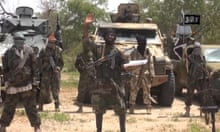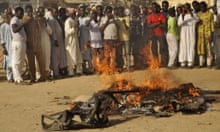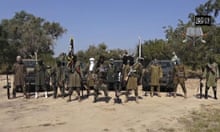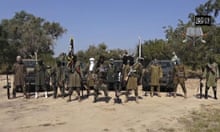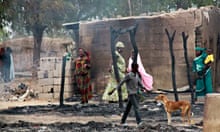The little girl in a tattered pink dress stood on the church steps, crying so hard she couldn’t get the words out. Someone had pointed her out to Father Maurice Kwairanga who was coaxing her to speak.
“What’s the matter?” he asked, leaning forward to hear her whispered reply. Her mother was too sick to come to the weekly food distribution, she said, wiping her eyes with her shawl. “Let her join the queue,” Kwairanga instructed his harried volunteers. “We really don’t have enough food to do this, but we can’t turn her away.”
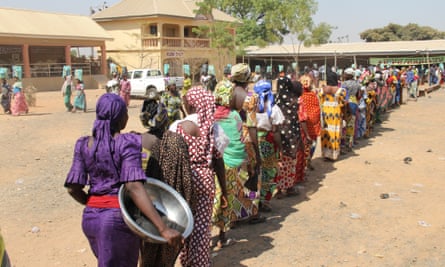
For more than a year, Islamists Boko Haram have fanned a slow-burning refugee crisis in Africa’s most populous – and nominally richest – nation. While the sect has drifted in and out of the international spotlight, its victims driven from their homes have quietly piled up under the radar of state and international officials, leaving ordinary Nigerians to act as a safety net for than 1.5 million internally displaced people (IDPs).
The violence has increased ahead of crucial February elections, raising fears it may not be possible to hold the polls in the three north-eastern states that are under a state of emergency. As the jihadis have seized more and more territory, ransacking previously safe towns, wave after wave of displaced people have fled, creating a looming humanitarian crisis in a country that anchors the region.
“It’s difficult to even set any kind of target because there are thousands of displaced people coming in by the day. The funding isn’t sufficient because the numbers keep increasing,” said Haruna Furo, director of the emergency management body in Adamawa state, sitting in his office with handwritten notes – there was no computer – scattered about his desk.
Refugees in the state capital, Yola, now outnumber the town’s population of 400,000, but aid workers say only a fraction of the 1.5 million uprooted from their homes have been settled in five overflowing official camps. The state also helps with 15 other “camp-like” settlements.
That has left ordinary citizens to rally together in search of a safe haven. In Adamawa state, ringed by the mountainous hideouts used by Boko Haram, schools, mosques, homes and churches like Kwairanga’s have become shelters for the displaced.
Back in Yola, after bags of beans were distributed to 4,000 people camped in the church’s red-dust compound, ordinary families sheltering dozens of refugees came to try to replenish their dwindling food sources. Men and children have been forbidden from coming to the collections as fights broke out.
“We keep going until we run out,” said Kwairanga, as a woman wearing only one sandal ran to join the queue. “The numbers are so overwhelming that what we’re giving is a drop compared to the needs. And there’s no sign that they’re going back any time soon.”
Later, he was forced to turn away hundreds of others empty-handed.
“Folks don’t realise how bad the situation here is. They haven’t made the connection between Boko Haram and this major looming crisis,” said Margee Ensign, director of the Yola-based American University, one of a handful of organisations providing relief.
Monica, a farmer from the district of Madagali who can’t stop thinking of the five bags of beans and 13 bags of maize she left behind when she fled with her eight children, stays in a windowless house set in a warren of sandy alleys. The arrangement is living testimony of the community’s attempt to absorb distressed neighbours.
Twenty-two people are crammed into an unfinished house donated by a local businessman, who loaned out the tiny, windowless building when he saw her and a group of fellow refugees sleeping rough in the streets. Bags of mismatched clothes came from strangers; a mat to sleep on and plastic cooking utensils from the Nigerian Red Cross.
“What’s worrying me right now is food. I’ve sat here like this for three days thinking about this,” said Monica. In the daytime, she sends her older children out to hawk plastic bags of water for five naira (2p) apiece – they need to sell 40 to afford a tube of toothpaste.
Madagali became a ghost-town after Boko Haram repeatedly raided it for food. Less than 1,000 of the original 135,000 inhabitants remained, an Oxfam report last year noted. Ragtag residents who trickled out had survived on wild leaves after walking through the bush for days.
“[The] majority of the IDPs are traumatised,” said Yinka Afolabi, humanitarian coordinator at Oxfam Nigeria. “Aggression is very common, and expressed in their communications and physically.”
Nigeria’s recently acquired status as Africa’s biggest economy hasn’t helped. “It’s affecting how projects are seen abroad – Nigeria is no longer seen as a priority. A lot of funding has been shifted elsewhere instead,” said an aid worker who spoke on condition of anonymity.
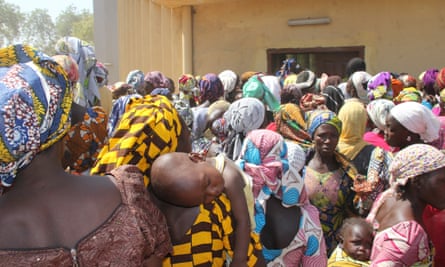
Furo, the state emergency coordinator, has a team of just 20 staff assigned to the 29,000 people in official camps, though they work with NGOs. Nigeria’s legendary bureaucratic hurdles are another challenge. “There are so many layers that the amount of money pledged to us now can take two years to actually reach us,” he said. “We’re trying our best.”
That’s little comfort for many who are far from home. In one camp, grandmother Maria recently decided to return to her home in Gwoza, an area the militants have declared their territory.
“She said she’s too old to be away from her house for so long,” her son said. “I worry about her, but I couldn’t stop her. She wants to be in her own home.”
